Compressor Oils UAE | Lubricants for Air Compressors
In the relentless engine of the UAE’s economy, where ambition is matched only by the scale of its construction and industry, air compressors are the indispensable workhorses. They are the silent force driving the pneumatic tools that build our skylines, the automated machinery in our factories, the climate control systems in our buildings, and even the processes in oil and gas refineries. Yet, within these critical machines, a component often treated as a simple commodity holds the ultimate power over their efficiency, longevity, and reliability: the compressor oil.
Choosing the right lubricant in the UAE is not a mere procurement decision; it is a core strategic imperative for any facility manager, engineer, or business owner. The region’s unique combination of extreme heat, abrasive sand, and high humidity creates a perfect storm of operational challenges that can rapidly degrade inferior lubricants, leading to catastrophic failures, exorbitant energy consumption, and devastating unplanned downtime. This exhaustive guide moves beyond the basics to provide a deep dive into the science, selection criteria, and strategic management of compressor oils, empowering you to make decisions that protect your assets and your bottom line.
Multifaceted Role of Compressor Oil: A Deep Dive into Functionality
While reducing friction is its primary function, modern compressor oil is a multi-talented fluid engineered to perform several simultaneous, life-extending duties:
Friction Reduction and Wear Prevention: This is the fundamental task. By forming a protective film between moving parts like rotors, vanes, pistons, and bearings, the oil minimizes metal-on-metal contact, preventing abrasive wear and catastrophic failure.
Heat Transfer and Cooling: The process of adiabatic compression generates immense heat. The compressor oil acts as a vital heat transfer medium, absorbing this thermal energy from the compression chamber and carrying it to the oil cooler and radiator. This is arguably its most critical function in the UAE’s extreme ambient temperatures, preventing the unit from overheating and seizing.
Sealing: In rotary screw compressors, the oil is injected into the compression chamber to create a seal between the male and female rotors. This sealing action is essential for maintaining high volumetric efficiency by preventing compressed air from leaking back to the intake side, ensuring the compressor delivers its rated capacity.
Contamination Control: The oil suspends and carries away contaminants such as wear particles, dust, and carbon deposits. It then passes through the oil filter, where these particulates are removed, keeping the internal system clean. Furthermore, high-quality oils contain additives that neutralize acidic by-products of combustion and oxidation, preventing corrosion of internal components.
Noise Reduction: The oil film dampens the sound of metal components moving at high speeds, contributing to a quieter operating environment.
Anatomy of a Premium Compressor Oil: Base Oils and Additives
The performance of a lubricant is determined by its two core components: the base oil and the additive package.
Base Oils: The Foundation
Base oils are categorized by the American Petroleum Institute (API) into five groups, with Group I being the least refined and Group V covering all other base oils like esters.
Group I & II: These are conventional mineral oils, refined from crude oil. They contain a higher degree of impurities, irregular hydrocarbon molecules, and are less stable at high temperatures. They are suitable for less demanding applications but have shorter service lives.
Group III: These are hydrocracked mineral oils. Through advanced processing, their hydrocarbon molecules are made more uniform and pure. They offer much better oxidation stability and performance than Group I/II oils and are sometimes marketed as synthetic or semi-synthetic.
Group IV (PAO – Polyalphaolefins): These are true synthetic hydrocarbons, engineered molecule-by-molecule for exceptional performance. They possess superior thermal and oxidative stability, a high viscosity index (meaning their viscosity changes less with temperature), and excellent flow characteristics at low temperatures. They are the gold standard for many industrial compressor applications.
Group V (Esters, PAGs): This group includes other synthetic bases like esters (diesters, polyol esters) and Polyalkylene Glycols (PAGs). Esters are polar, meaning they naturally adhere to metal surfaces, providing excellent lubricity and solvency to keep systems clean. PAGs are renowned for their exceptional ability to reduce carbon deposit formation and extend drain intervals significantly.
Additive Package: The Performance Enhancers
Additives are chemical compounds that imbue the base oil with specific properties:
Antioxidants: Slow down the oxidation process, which is the reaction of oil with oxygen at high temperatures, the primary cause of oil degradation.
Anti-wear (AW) Agents: Form a protective layer on metal surfaces to prevent wear under boundary lubrication conditions.
Rust and Corrosion Inhibitors: Protect ferrous and non-ferrous metals from acidic and aqueous corrosion.
Demulsifiers: Enable the oil to separate quickly and cleanly from water, a critical feature given the high humidity levels in the UAE.
Foam Inhibitors: Prevent the formation of stable foam, which can impair lubrication and heat transfer.
Metal Deactivators: Passivate metal surfaces to reduce their catalytic effect on oxidation.
Detailed Comparison: Mineral vs. Semi-Synthetic vs. Synthetic Oils
The following table provides a clear, at-a-glance comparison to guide the selection process.
| Feature | Mineral Oil (Group I/II) | Semi-Synthetic (Blend) | Full Synthetic (Group IV/V) |
|---|---|---|---|
| Base Oil | Refined Crude Oil | Blend of Mineral & Synthetic (e.g., Group II/III + PAO) | PAO, Esters, PAGs (Engineered) |
| Thermal/Oxidative Stability | Poor to Fair. Breaks down quickly at high temps. | Good. Better than mineral alone. | Excellent. Resists breakdown in extreme UAE heat. |
| Viscosity Index (VI) | Low. Viscosity changes significantly with temperature. | Moderate. | Very High. Stable viscosity from cool mornings to hot afternoons. |
| Volatility | High. More prone to evaporation and oil carry-over. | Moderate. | Low. Reduced evaporation loss and consumption. |
| Drain Intervals | Short (500 – 2,000 hours). | Moderate (2,000 – 4,000 hours). | Very Long (8,000+ hours). Often 2-4x longer than mineral. |
| Energy Efficiency | Lower. Higher friction. | Moderate. | Higher. Superior lubricity reduces energy consumption by 5-8%. |
| Protection against Wear | Basic. | Good. | Superior. Maximum protection for critical components. |
| Resistance to Sludge/Varnish | Low. Prone to carbon deposits. | Moderate. | High. Keeps the system cleaner for longer. |
| Water Separation | Variable, often poor. | Good. | Excellent. Critical for humid environments. |
| Initial Cost | Lowest | Moderate | Highest |
| Total Cost of Ownership (TCO) | Highest. Frequent changes, downtime, energy waste. | Moderate. |
Compressor Oil Types: Chemistry, Performance, and Economics
The choice of base oil chemistry dictates nearly every aspect of performance. Understanding these categories is the first step in making a strategic selection.
1. Mineral-Based Compressor Oils (Petroleum-Based)
Derived from crude oil through a refining process, these are the traditional workhorses. They are a blend of naturally occurring hydrocarbon molecules of varying sizes and structures.
Pros:
Cost-Effective Initial Investment: They have the lowest initial purchase price per liter, making them attractive for budget-conscious operations.
Adequate for Standard Applications: Suitable for smaller reciprocating compressors or rotary screw compressors operating under light loads and in stable, moderate temperatures.
Cons:
Poor Thermal and Oxidative Stability: The irregular molecular structure of mineral oil breaks down quickly under high thermal stress. This leads to the formation of sludge, varnish, and carbon deposits on valves, rotors, and bearings, which impairs efficiency and can cause premature failure.
Shorter Service Life: They require more frequent oil changes due to rapid oxidation. This increases downtime, labor costs, and the volume of waste oil for disposal.
Higher Evaporation Loss: Lighter molecules tend to evaporate more quickly in hot environments, leading to higher oil carry-over and consumption.
Narrow Viscosity Range: Their viscosity changes significantly with temperature (low viscosity index), offering less stable protection during the scorching summer heat versus the milder winter months in the UAE.
2. Synthetic-Based Compressor Oils
These are not simply refined; they are chemically engineered from modified petroleum components or synthesized from raw materials like natural gas to create uniform, designer molecules (e.g., Polyalphaolefins – PAOs, esters, alkylated aromatics).
Pros:
Exceptional Thermal and Oxidative Stability: The uniform molecular structure resists breakdown at high temperatures, drastically reducing sludge and deposit formation. This is the most significant advantage for UAE conditions.
Extended Drain Intervals: Synthetic oils can last 2 to 4 times longer than mineral oils. This reduces downtime, lowers lubricant consumption, and cuts waste disposal costs, leading to a superior Total Cost of Ownership (TCO) despite a higher initial price.
Superior High-Temperature Performance: They maintain a stable viscosity across a wide temperature range (high viscosity index), ensuring consistent protection and sealing in both summer and winter.
Lower Volatility: Reduced evaporation loss means less oil is carried over into the compressed air system, protecting downstream equipment and reducing consumption.
Improved Energy Efficiency: Their natural lubricity and stable viscosity can reduce the energy required to overcome fluid friction, leading to marginal but valuable energy savings.
Cons:
Higher Initial Cost: The advanced manufacturing process makes them more expensive per liter upfront.
Material Compatibility: Certain synthetic chemistries (e.g., esters) may not be compatible with specific seals or hoses designed for mineral oil, necessitating a check with the OEM.
3. Semi-Synthetic Compressor Oils (Blends)
These are a hybrid, typically consisting of a high percentage of mineral oil blended with a synthetic component (often 20-30% synthetic).
Pros:
Middle-Ground Performance: Offer better oxidation stability and longer life than pure mineral oils at a lower cost than full synthetics.
Good for Transitional Use: A good option for operations looking to step up from mineral oil without the full investment in a synthetic fluid.
Cons:
Performance Ceiling: Their capabilities are limited by the mineral oil content and cannot match the extreme temperature performance and longevity of a full synthetic.
UAE Operating Environment: A Stress Test for Lubricants
The local climate is the single greatest factor influencing lubricant choice.
Extreme Heat: The constant high ambient temperature adds a significant heat load to the compressor’s cooling system. Oils are subjected to prolonged thermal stress, accelerating oxidation. A lubricant with a high viscosity index and a high flash point is non-negotiable.
Abrasive Contaminants: Fine desert sand and dust (silica) are highly abrasive. If ingested, they act like lapping compound, accelerating wear on bearings, rotors, and cylinders. Premium oils with high film strength and effective contaminant suspension are essential.
High Humidity: The coastal Gulf air is saturated with moisture. This leads to increased water condensation inside the compressor system. Water causes oil emulsification, corrosion, and hydrolysis (breakdown of the oil and its additives). A premium lubricant must have rapid and clean water separation properties (demulsibility).
Case in Point: The Value of a Specialized Partner like Rumanza Lubricants
Navigating these technical challenges requires more than just a product; it requires a partnership with a lubricant specialist that understands the regional operating environment. This is where established providers like Rumanza Lubricants demonstrate their value. They are not merely suppliers but technical partners who offer solutions engineered for the Gulf climate.
Rumanza Lubricants and other leading providers typically offer a range of high-performance synthetic and semi-synthetic compressor oils that are specifically formulated to:
Withstand extreme oxidative and thermal stress.
Exhibit exceptional demulsibility to handle humid intake air.
Provide superior anti-wear protection against abrasive particulate contamination.
Extend oil life by 3-4 times compared to conventional mineral oils, directly reducing maintenance costs and environmental waste.
Improve energy efficiency, a critical factor given the energy costs in the UAE.
Partnering with such a provider ensures access to not just premium products, but also expert technical support, oil analysis programs, and tailored recommendations based on your specific compressor make, model, and operating conditions.
Advanced Best Practices: Beyond the Basic Oil Change
Oil Analysis as a Predictive Tool: The most advanced practice is to implement a routine oil analysis program. This involves taking a small sample of oil during operation and sending it to a laboratory for analysis. The report provides a detailed diagnostic of your compressor’s health:
Wear Metals: Identifies types and concentrations of metals (e.g., iron, copper, chromium) indicating wear from specific components.
Contamination: Measures levels of water, dirt (silicon), and glycol.
Oil Condition: Measures viscosity, Total Acid Number (TAN), and additive depletion to scientifically determine the optimal oil change interval.
Proper Viscosity Selection: Always follow the OEM’s viscosity recommendation (e.g., ISO VG 46, 68, 100). Using an oil that is too light can lead to inadequate lubrication and wear. Using an oil that is too heavy can increase mechanical drag and energy consumption.
System Flushing: When switching from a mineral oil to a synthetic, or if the system is heavily sludged, a flush procedure is recommended. This involves circulating a specialized flushing fluid to dissolve and remove old deposits before filling with the new premium oil, ensuring its full performance is not immediately compromised.
Final Thoughts
The selection of lubricants for air compressors is a critical business decision with direct consequences for productivity, maintenance budgets, and energy costs. For operations in the UAE, the harsh climate makes the choice unequivocal.
While mineral oils may seem appealing for their low initial cost, they are a false economy for any serious industrial application. The data clearly shows that full synthetic compressor oils provide the only sensible path forward, offering the resilience, longevity, and protection required to withstand the region’s extreme conditions. The extended drain intervals and improved reliability they provide directly translate into higher uptime, lower operating costs, and greater peace of mind.
Therefore, the mandate for decision-makers is clear: Consult your equipment manual, assess your operational demands, and engage with a technically proficient lubricants company in the UAE that can provide engineered solutions, not just commodities. By partnering with an industry leader like Rumanza Lubricants, you are not just buying a barrel of oil; you are investing in the reliability, efficiency, and longevity of a system that is fundamental to your success. In the demanding industrial heart of the UAE, that is an investment that pays dividends every single day.
FAQs
Key indicators include:
Darkening and Thickening: The oil has become very dark and viscous, indicating advanced oxidation.
Burnt Smell: The oil has a sharp, acrid, or burnt odor.
Increased Operating Temperature: The compressor is running hotter than usual.
Sludge Formation: Visible sludge or carbon deposits are present on dipsticks or in the sump.
Poor Performance: A noticeable drop in compressor efficiency or pressure.
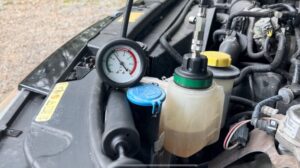
Radiator Stop Leak UAE: Quick Fix for Vehicle Cooling System Leaks
Radiator Stop Leak UAE: Quick Fix for Vehicle Cooling System Leaks Discover More Introduction: The Unforgiving UAE Climate and Your Vehicle’s Lifeline The United Arab Emirates’ automotive landscape is defined by extremes. Ambient temperatures that regularly surpass 45°C (113°F), coupled with intense urban congestion and long, high-speed desert drives, create a perfect storm of thermal stress for every vehicle. In this environment, your engine cooling system is not merely a subsystem; it is the single most critical component preventing catastrophic engine failure.
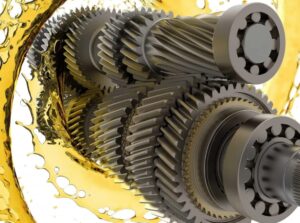
What Type of Transmission Oil in UAE Does My Car Need? Your Complete Guide
What Type of Transmission Oil in UAE Does My Car Need? Your Complete Guide Discover More Navigating the vast, sun-baked highways of the United Arab Emirates—from the dynamic urban sprawls of Dubai and Abu Dhabi to the majestic desert dunes and the tranquil mountain passes of the Hajar range—places extraordinary mechanical and thermal stress on every component of your vehicle. While conscientious drivers often prioritize engine oil changes, the vital lifeblood safeguarding the transmission, the complex heart of your car’s

Guide to UAE Turbine Oil Selection Application & Management for Industrial Facilities
Guide to UAE Turbine Oil Selection, Application, and Management for Industrial Facilities Discover More In the hyper-competitive industrial landscape of the United Arab Emirates, where operational excellence directly translates to economic advantage, turbine lubrication represents a critical nexus of reliability engineering and strategic asset management. This comprehensive guide, developed with technical insights from Rumanza Lubricants, provides an unprecedented deep dive into the science, selection criteria, and life-cycle management of turbine oils specifically engineered for the extreme operating conditions of the
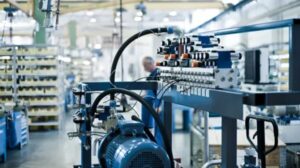
Synthetic vs. Mineral Hydraulic Oil in UAE : Which is Best for Your Operation?
Synthetic vs. Mineral Hydraulic Oil in UAE : Which is Best for Your Operation? Discover More Across the dynamic landscape of the United Arab Emirates—from the megaprojects of Dubai Marina to the intricate conveyor systems of Jebel Ali Port, from the massive hydraulic shovels in Al Dhafra quarries to the precision automated lines in Abu Dhabi’s industrial cities—the silent, powerful force of hydraulics is indispensable. These systems convert fluid power into monumental force and precise motion. At the core of

What is a Pour Point Depressant? | Benefits, Uses & How It Works Mechanism
What is a Pour Point Depressant? | Benefits, Uses & How It Works Mechanism Discover More In the intricate world of lubricant formulation, few additives play as critical yet understated a role in cold-weather operability as Pour Point Depressants (PPDs). These specialized chemical compounds are the linchpin that prevents machinery from seizing up when temperatures plummet. This in-depth guide goes beyond the basics, exploring the sophisticated chemistry, detailed mechanism, nuanced benefits, and practical considerations of PPDs. We will also examine the
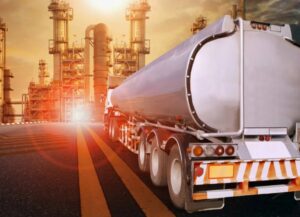
Guide to Gasoline Engine Oils for UAE’s Extreme Climate: Engineering Peak Performance
Gasoline Engine Oils for UAE’s Extreme Climate: Engineering Peak Performance Discover More In the heart of the Arabian Peninsula, the United Arab Emirates stands as a testament to human ambition, with its engineering marvels and endless highways. Yet, this environment of soaring achievement is also one of the most punishing on Earth for machinery. For your vehicle—whether a nimble city sedan, a powerful family SUV, or a high-performance sports car—the UAE’s climate is a relentless adversary. The choice of engine

What are Polyol Ester Oils & Lubricants – Properties & Applications
What are Polyol Ester Oils & Lubricants – Properties & Applications Discover More In the intricate world of industrial machinery, automotive engines, and advanced refrigeration systems, the choice of lubricant is not merely a maintenance task—it’s a critical engineering decision. While conventional mineral oils have served us for over a century, the demands of modern technology require fluids that can perform under extreme pressure, temperature, and environmental stress. This is where synthetic lubricants, specifically Polyol Ester oils, come to the forefront.
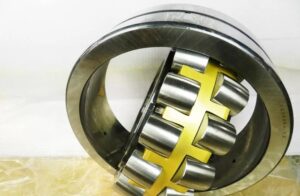
Guide to Choosing the Right Lithium Complex Grease in UAE
Guide to Choosing the Right Lithium Complex Grease in UAE for Unbeatable Performance Discover More In the heart of a region defined by its ambition and extreme climate, the machinery that builds and powers the UAE operates under immense pressure. From the towering cranes sculpting Dubai’s skyline to the massive haul trucks in Abu Dhabi’s industrial zones and the relentless conveyor systems in Jebel Ali Port, every moving part is a critical link in the chain of progress. Protecting these

Lithium Grease UAE – Buy Multi-Purpose Lubricant Grease
Lithium Grease UAE – Buy Multi-Purpose Lubricant Grease Discover More In the relentless engine of the United Arab Emirates’ economy—where monumental construction, non-stop logistics, and a climate of extreme heat and abrasive sand are the norm—the battle against friction and corrosion is perpetual. The integrity of a construction crane’s slewing ring, the smooth operation of a delivery fleet’s wheel bearings, and the silent efficiency of a hotel’s HVAC system all hinge on a single, critical decision: the choice of lubricant.
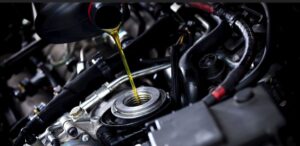
Best CNG Engine Oil in UAE for Cars – Protect Your CNG Engine
Best CNG Engine Oil in UAE for Cars – Protect Your CNG Engine Discover More The automotive landscape in the UAE is undergoing a quiet revolution. As fuel prices fluctuate and environmental consciousness grows, more and more drivers are making the intelligent switch to Compressed Natural Gas (CNG). CNG-powered cars offer significant cost savings on fuel and produce fewer emissions, making them an economically and ecologically sound choice. However, this transition comes with a critical responsibility: understanding that a CNG
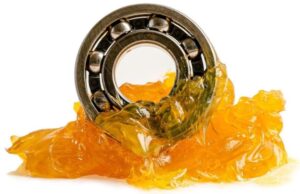
Calcium Sulphonate Grease UAE | High-Temperature Grease
Calcium Sulphonate Grease UAE | High-Temperature Grease Discover More Introduction: The Unforgiving Demands of UAE Industry The United Arab Emirates stands as a global titan of industry and infrastructure. From the sprawling metallurgical plants in Mussafah and the massive port operations of Jebel Ali to the relentless pace of construction shaping Dubai’s skyline and the vast logistics hubs of Al Ain, the machinery that powers this nation operates under extreme duress. Soaring ambient temperatures that regularly exceed 45°C, pervasive dust
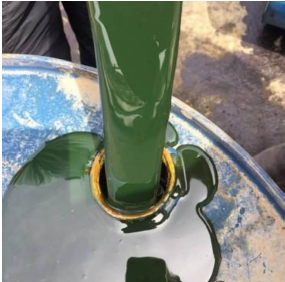
What is Rubber Process Oil? | Guide to Applications, Benefits, and Selection
What is Rubber Process Oil? | Guide to Applications, Benefits, and Selection Discover More In the sophisticated ecosystem of rubber manufacturing, raw polymers are the canvas, but rubber process oil is the essential medium that brings the masterpiece to life. It is the critical component that transforms rigid, unworkable raw materials into the versatile, durable, and high-performance rubber products that define modern industry and daily convenience. For specialists dedicated to chemical innovation and precision, such as the team at Rumanza Lubricants, the science
